Blog Content
4
Jun
2025
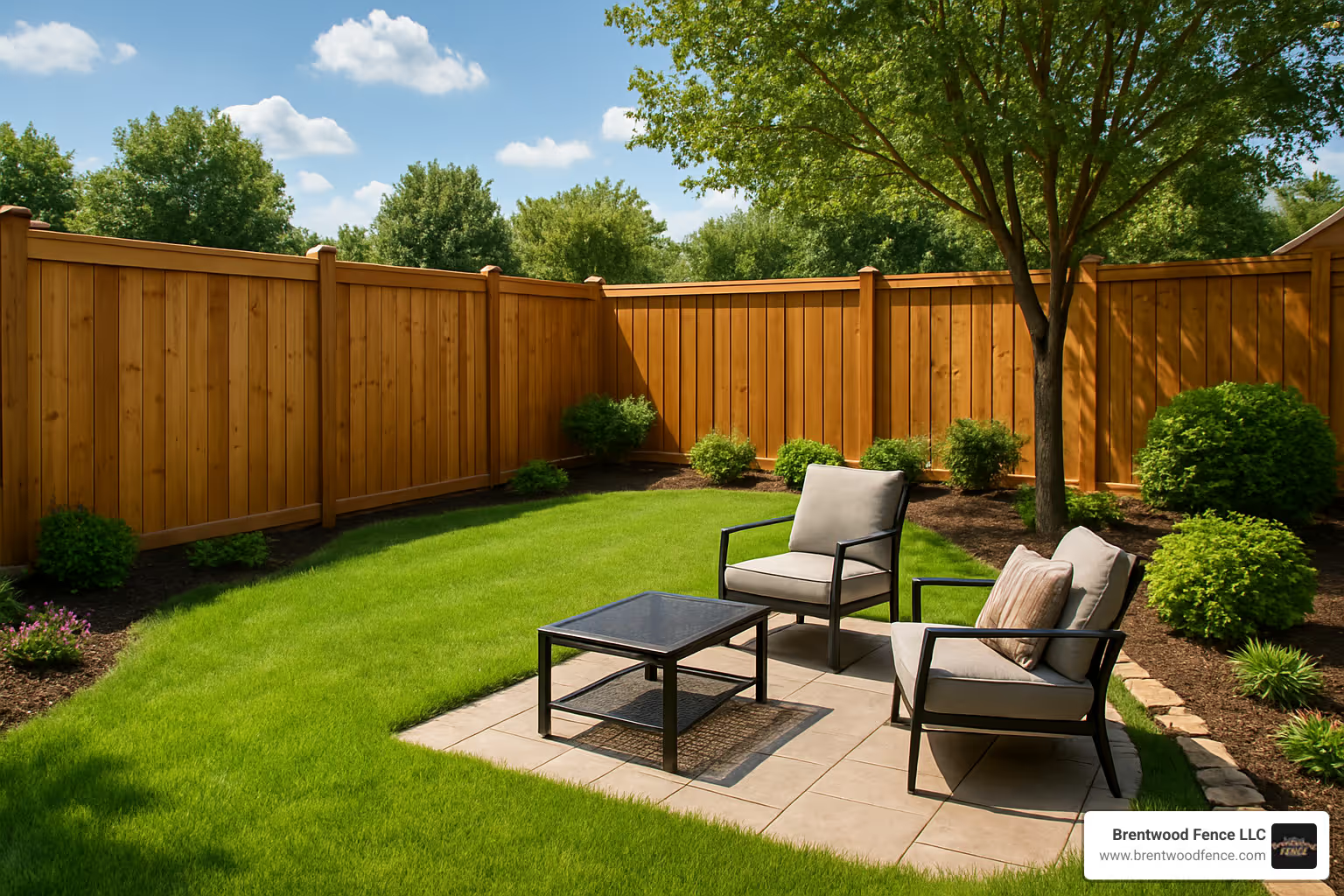
Fence installation companies provide expert services for homeowners looking to improve privacy, security, and curb appeal. If you're searching for reliable professionals, here's what you need to know:
Top-Rated Fence Installation Companies:
Finding the right fence contractor can make or break your home improvement project. Whether you're looking to contain pets, create privacy from neighbors, or boost your property's aesthetic appeal, professional installation ensures your fence stands strong for years to come.
The average cost to install a fence ranges from $1,760 to $4,500, with prices varying based on materials, length, and complexity. Chain-link fences start around $7-12 per linear foot, while vinyl privacy fences typically run $19-22 per linear foot.
Most fence installation projects take between 2-4 days to complete. Professional installers handle everything from property line verification and utility marking to post setting and final cleanup.
"Many states require fencing installers to be licensed, and reputable companies often carry general liability insurance and offer warranties on their work." - Better Business Bureau
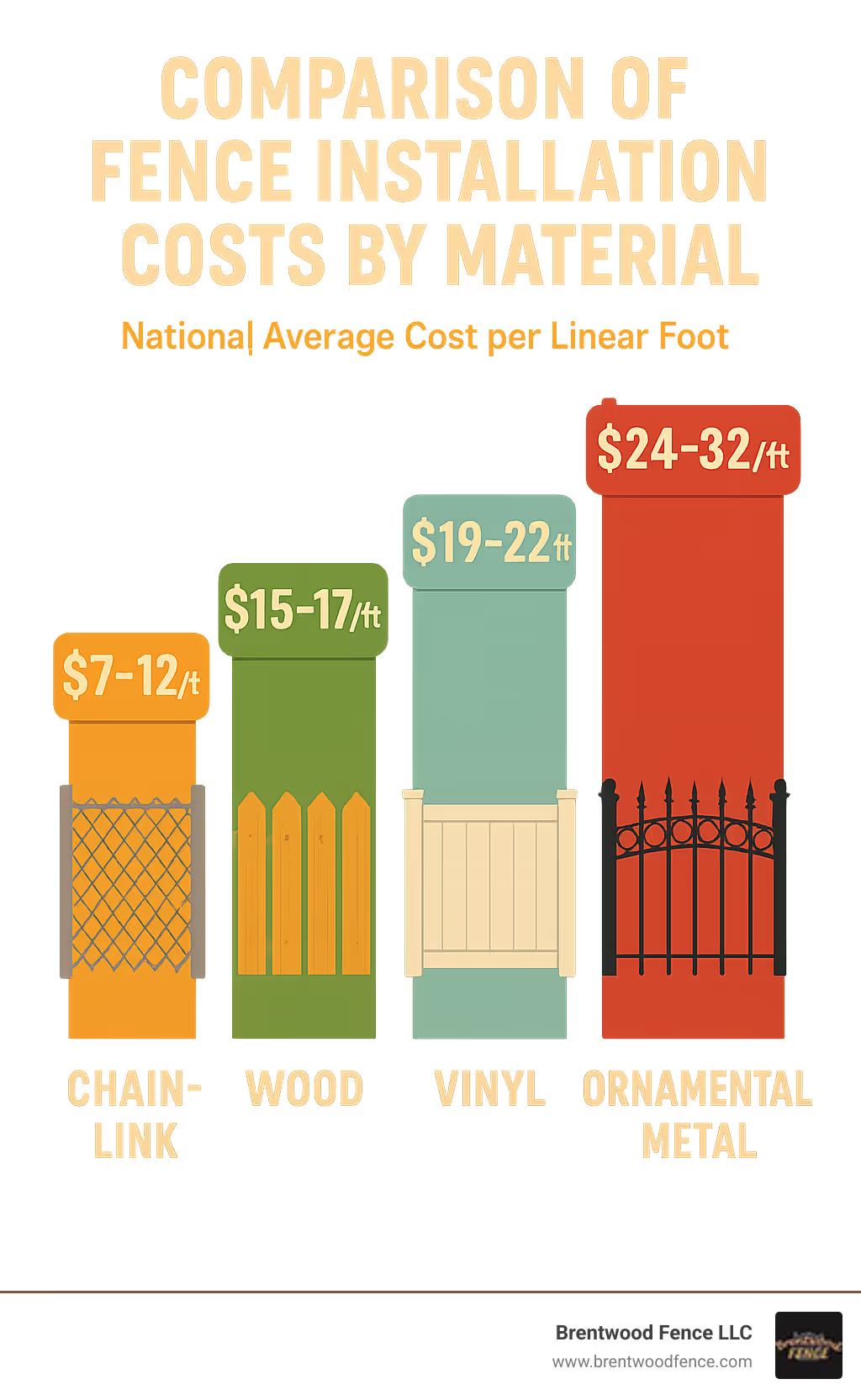
Looking for the right partner to build your dream fence can feel overwhelming. With so many fence installation companies out there, how do you separate the true professionals from those who might leave you with a wobbly fence?
The best fence contractors guide you through a thoughtful process from your first phone call to the final inspection. They'll handle everything from providing detailed estimates to navigating building codes and HOA regulations.
When evaluating potential fence installers, focus on these essentials: proper licensing, comprehensive insurance coverage, solid warranties on both labor and materials, and familiarity with local requirements. Your fence is a long-term investment, so the company installing it should stand behind their work.
Start by checking credentials and insurance certificates—legitimate companies will happily provide these. Then dig into customer reviews across multiple platforms. Pay special attention to how they've handled any problems that arose. Finally, ask to see photos of completed projects similar to what you're envisioning.
For added peace of mind, consider working with BBB accredited contractors who've committed to maintaining ethical business standards.
The most reliable fence installation companies offer far more than just basic residential fencing. They understand that different customers have unique needs.
For homeowners, quality installers offer everything from classic privacy fences to decorative front yard pickets that improve curb appeal. They'll also install specialized options like code-compliant pool enclosures or custom pet containment systems.
Business owners benefit from commercial services including secure perimeter fencing, industrial barriers, and attractive retail property boundaries. Many companies also offer temporary fence rentals, gate automation systems, and professional repairs.
Professional installers will come to you for a no-pressure consultation, take measurements, and provide a detailed written estimate before you commit to anything.
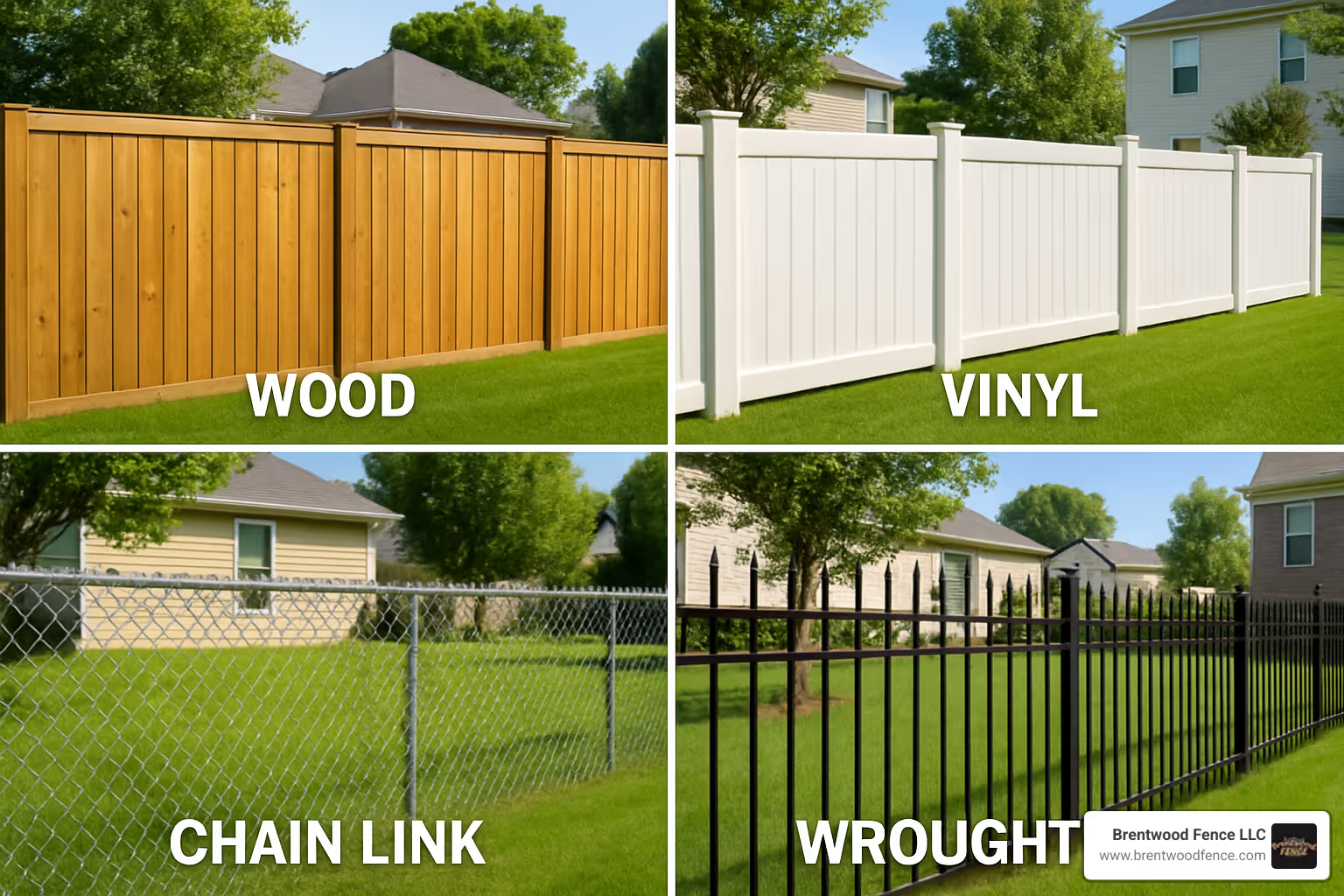
When discussing your project with fence installation companies, material choice will significantly impact everything from cost to longevity:
Wood fencing brings natural warmth and charm. It's relatively affordable and offers endless customization options. The downside? You'll need regular maintenance—staining or sealing every few years—to prevent rot, insect damage, and warping.
Vinyl fencing is virtually maintenance-free (just an occasional hosing off), won't fade or rot, and typically comes with an impressive warranty. The initial cost is higher than wood, but many homeowners find the long-term value worth it.
Chain-link remains the budget-friendly champion. It's incredibly durable, requires almost no maintenance, and works perfectly for containing pets. However, it provides minimal privacy and has a utilitarian look.
Ornamental metal fencing in aluminum or steel offers timeless appeal. These fences provide excellent security while maintaining visibility and require very little upkeep. The premium appearance comes with a premium price tag.
Eco-conscious homeowners might consider composite fencing, which combines recycled plastics and wood fibers. It offers the look of wood without the maintenance headaches.
When interviewing potential fence contractors, asking the right questions can save you from future disappointment:
A NH professional fence installer should welcome these questions and provide clear, confident answers.
Working with properly licensed and insured fence installation companies protects your property and investment.
Licensing requirements vary by state, but legitimate fence contractors will have all necessary credentials. Some may even hold specialty certifications for particular fence types. Never hesitate to ask for license numbers and verify them with your state's licensing board.
Insurance coverage is non-negotiable. Your fence installer should carry general liability insurance (typically $1 million or more) and workers' compensation insurance.
Warranties are where many companies distinguish themselves. Look for fence contractors offering robust labor warranties (typically 1-5 years) that cover installation-related issues. Material warranties vary by product—vinyl often comes with limited lifetime coverage, while wood products might be warranted for 15-20 years against defects.
Always get warranties in writing and understand exactly what's covered. The best companies offer clear, comprehensive warranty documents. Check out our Fence Installation Client Commitment to see what a straightforward warranty should look like.
Want to learn even more about what professional installation entails? Visit our detailed guide on professional fence installation basics.
Let's talk money – because when it comes to fencing, understanding the costs helps you avoid sticker shock. Most homeowners are surprised to learn that materials typically make up about 60% of your total project cost, with the remaining 40% covering skilled labor.
Fence installation companies generally price their work per linear foot. Your final bill depends on several key factors:
The material you choose impacts your wallet the most – chain-link fences are budget-friendly while ornamental metal designs command premium prices. Fence height matters too; those extra feet mean more materials and labor hours. If your yard has slopes and rocky terrain, expect to pay more for the additional challenges.
Limited access for equipment means more manual labor. And if you're replacing an old fence, factor in removal costs that can add several hundred dollars to your project.
Don't forget those "extras" – permit fees typically run $50-200 depending on your town, gates add $100-500+ each, and decorative post caps cost extra too.
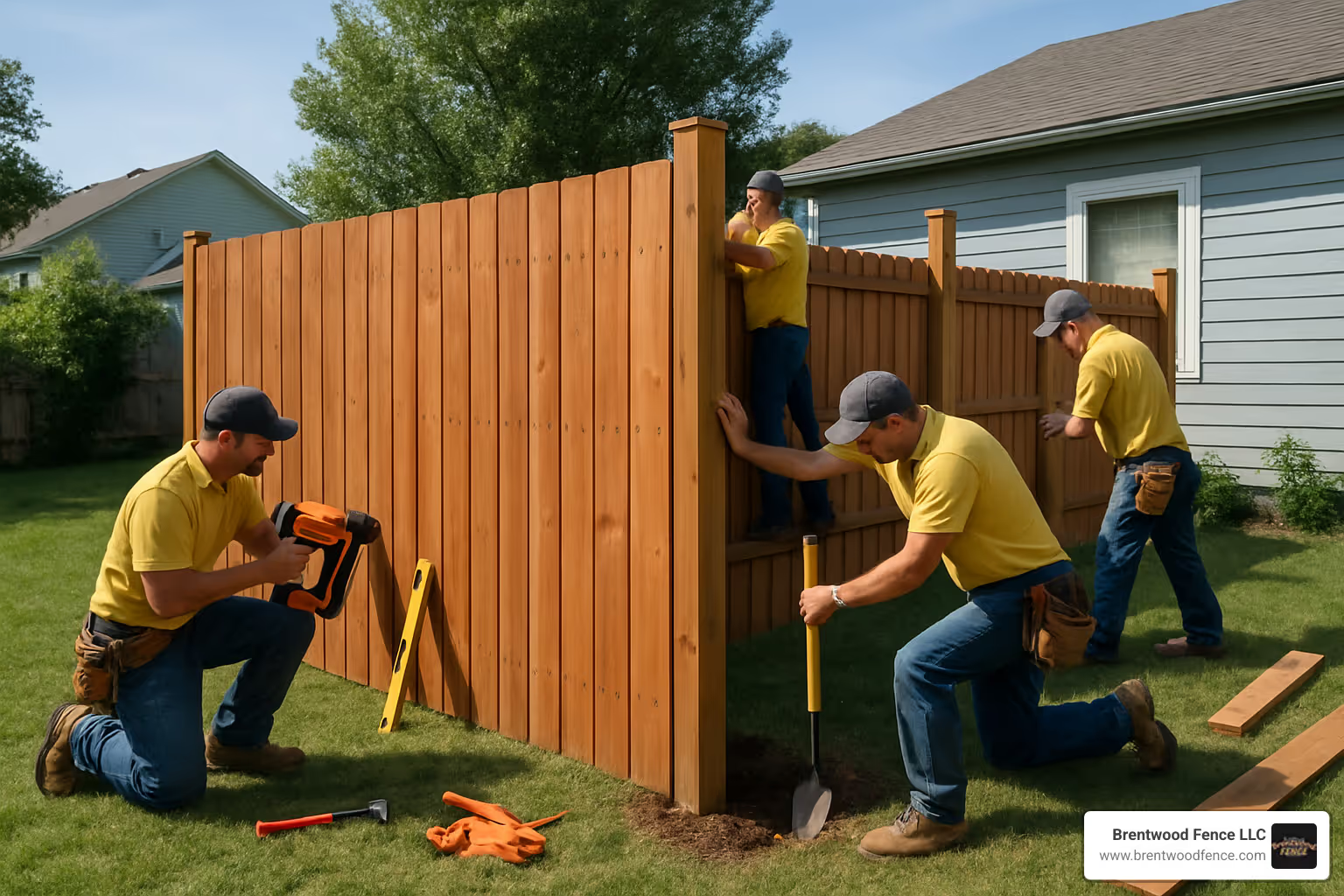
When budgeting for your fence project, here's what you can expect to pay when working with fence installation companies:
Wood fencing (pressure-treated pine) typically runs $15-17 per linear foot installed, while vinyl jumps to $19-22. Chain-link remains the most affordable at $7-12 per foot. Ornamental aluminum costs $24-32, with wrought iron commanding $30-50 for its timeless elegance.
Labor costs average around $50 per hour per worker, with most projects requiring a team of 2-3 people working 1-3 days, depending on your fence length and site conditions.
Living in New England? Costs in New Hampshire, Massachusetts, and Maine typically run 10-15% higher than the national average due to higher regional labor rates and deeper post foundations needed for frost lines.
Most reputable fence installation companies in NH, ME and MA offer payment options to make your investment more manageable.
The typical payment structure involves a 50% deposit to secure your spot on the schedule, with the remaining balance due upon completion. For larger properties, some contractors offer milestone payments.
Many companies now partner with financing providers to offer options like credit card payments (sometimes with cash discounts), home improvement loans through local banks, and "same-as-cash" plans that charge no interest if you pay within the promotional period (usually 6-12 months).
Don't be shy about asking for discounts – scheduling your installation during the off-season (late fall or winter) can sometimes save you 10-15%.
Need financing help? Contact our team to discuss your options or Get Financing through our trusted partners.
A quality fence typically recoups 50-70% of its cost in increased property value – not a bad return for an improvement that delivers daily enjoyment!
Certain fence types deliver better returns than others. Privacy fences in densely populated neighborhoods often bring the highest value. Decorative front yard fencing that improves curb appeal can make your home stand out, while pool enclosures that meet safety codes transform a potential liability into a selling feature.
Real estate agents consistently report that homes with well-maintained, attractive fencing tend to sell faster than comparable unfenced properties, especially in family neighborhoods.
The key to maximizing value? Choose a fence style that complements your home's architecture.
Smart homeowners think beyond the initial price tag to consider the true long-term cost of their fencing choice:
Wood fencing offers warm, natural appeal with the lowest upfront cost, but when you factor in regular maintenance, vinyl and aluminum often prove more economical over decades of ownership.
Ready to explore your options? Get your Free Fencing Installation Estimate today.
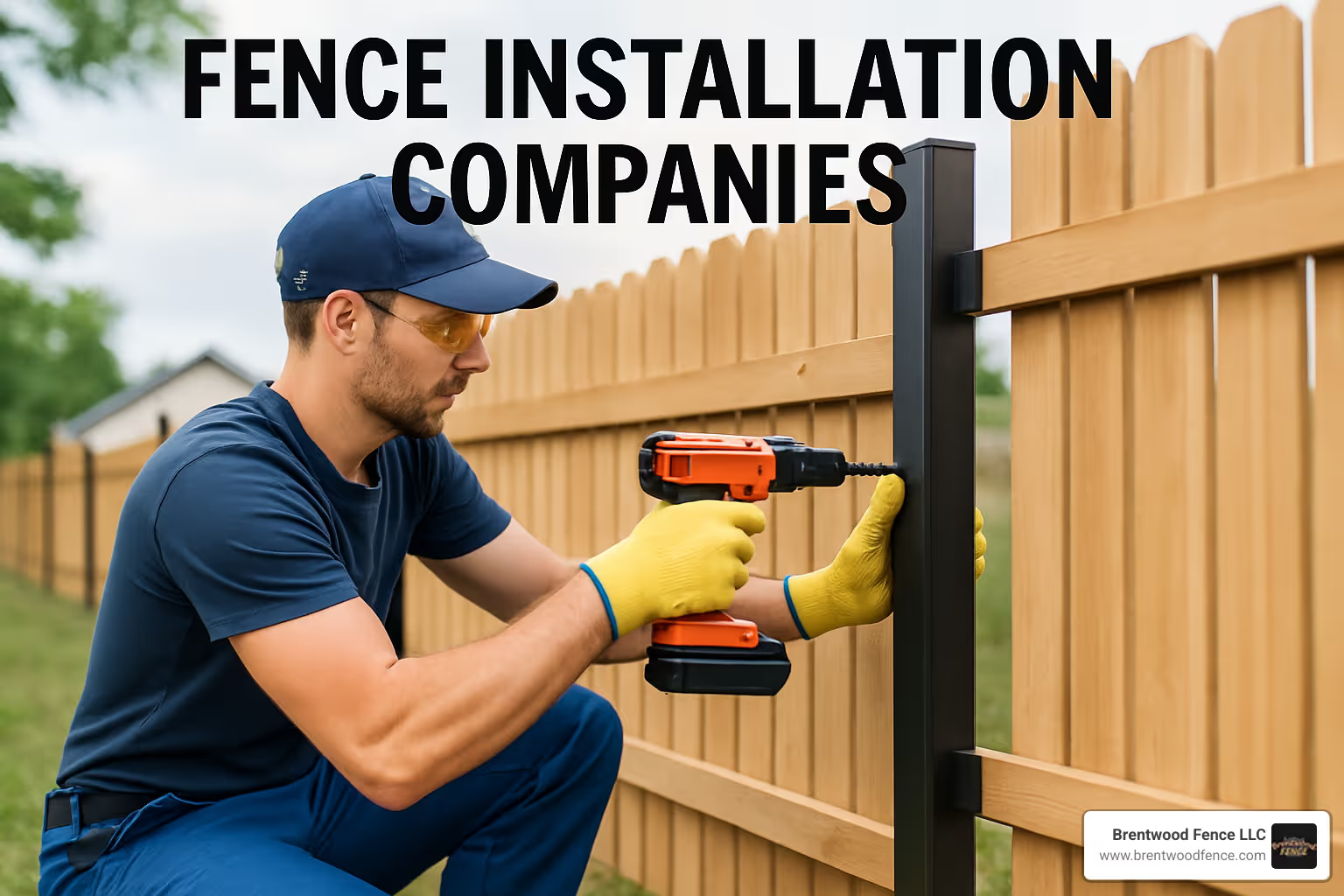
Ever wondered what actually happens when you hire professionals to build your fence? Fence installation companies follow a carefully orchestrated process that turns your backyard dreams into reality.
It begins with an initial consultation where we'll walk your property, measure boundaries, spot any obstacles, and listen to what you're hoping to achieve. After our visit, we prepare a detailed quote that accounts for materials, labor, and any site challenges.
Once you give us the green light, we'll call 811 to mark underground utilities, handle all permit paperwork, order materials, and confirm your installation date.
When installation day arrives, our crew starts by preparing the ground – clearing vegetation, removing obstacles, and marking your fence line. Then comes the most critical part: setting those posts. We dig deep (well below the frost line in New England winters), set posts in concrete, and ensure perfect alignment.
After allowing the concrete to properly cure, we install the rails and panels with meticulous attention to spacing and alignment. Any gates are carefully hung with quality hardware to ensure smooth operation. We'll add finishing touches like post caps or decorative elements.
Before we pack up, we conduct a thorough inspection, test all gates, clean up completely, and walk through the completed project with you.
This methodical approach is why professional installation makes such a difference. Learn more about our expert approach in our Expert Fence Install Near You: Guide.
Several factors influence your project timeline when working with fence installation companies.
For most residential projects: from initial consultation to receiving your quote typically takes 1-3 days. After approval, material delivery usually takes 1-3 weeks. The utility marking service (811) needs 3-5 business days, and permit approval can take 1-2 weeks. The actual installation usually takes 2-4 days for an average home.
What might slow things down? Crew size matters – smaller teams may take longer but often provide more personalized attention. Weather delays are a reality in New England. Custom fabrication needs extra time. Site challenges like rocky soil or steep slopes can slow progress. Material shortages sometimes occur, especially during peak season.
Most experienced fence installation companies build flexibility into their schedules. We'd rather promise a realistic timeline than disappoint you with delays.
Navigating the red tape of fence installation doesn't have to give you a headache – that's part of what you're paying professionals for! Most towns require permits for fences over a certain height (typically 3-4 feet), with front yard fences often facing stricter limitations.
Zoning considerations include setback requirements, height restrictions that vary by zone and fence location, and sometimes material restrictions. Waterfront properties often have additional regulations.
Beyond the legal requirements, there's the human side – your neighbors. Good fence etiquette goes a long way toward maintaining peaceful relationships. We always recommend communicating your plans before installation begins. Confirm property boundaries, discuss which side of the fence will face outward, and address any concerns about views or access.
Professional fence installation companies like Brentwood Fence are familiar with local regulations throughout New Hampshire, Massachusetts, and Maine, and we handle all necessary paperwork.
A little preparation helps ensure your fence installation goes smoothly. Before our crew arrives:
These simple preparations help prevent delays and ensure your project stays on schedule and within budget.
After installing thousands of fences, we've seen every mistake in the book – usually when fixing DIY projects gone wrong. Professional fence installation companies know how to avoid these costly pitfalls.
Insufficient post depth is perhaps the most common error. While DIYers often set posts just a foot or two deep, professionals dig well below the frost line (36-48 inches in New England).
Ignoring grade changes leads to awkward-looking installations. Professionals use "stepping" or "racking" techniques to follow terrain contours while maintaining level tops.
Improper material selection can lead to premature failure. We recommend climate-appropriate options based on local conditions.
Incorrect hardware is a small detail with big consequences. Professionals use galvanized, stainless steel, or coated fasteners specifically designed for outdoor use.
Poor gate installation is immediately noticeable when gates sag or don't latch properly. Professional installers use diagonal braces and heavy-duty hinges.
Perhaps most dangerous is overlooking utilities – digging without proper utility marking can result in service disruptions, expensive repairs, or even life-threatening situations.
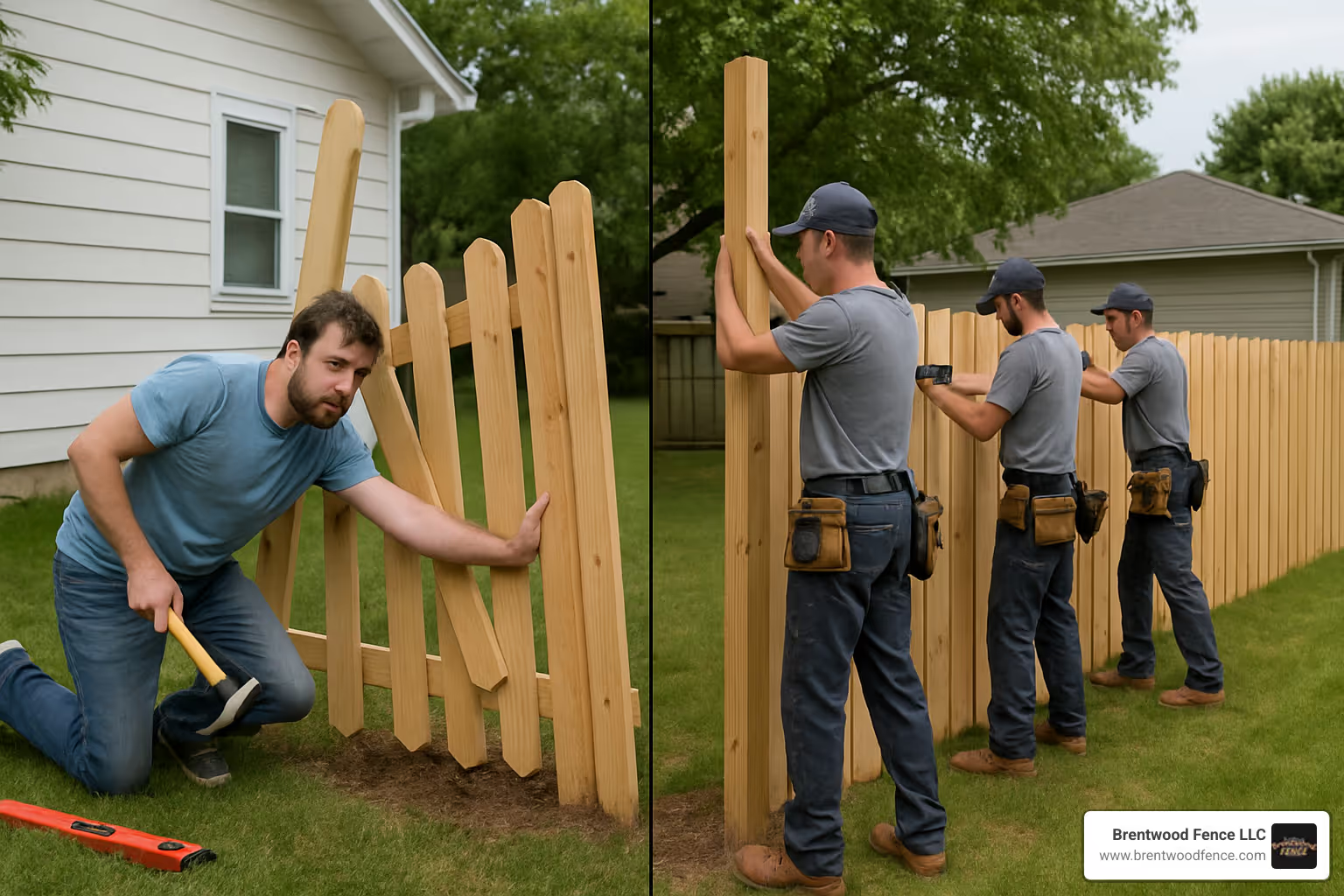
When it comes to installing a new fence, you're faced with a crucial decision: tackle it yourself or hire professionals? This choice impacts not just your wallet, but also the longevity and appearance of your fence.
If you're considering the DIY route, be honest about your skill level. Proper fence installation requires experience with post-hole diggers, levels, and various power tools. Time commitment is another factor – what professionals complete in days typically takes homeowners several weekends. You'll also need to factor in around $300-500 for specialized tools.
"I thought I'd save money installing my own fence," shares one New Hampshire homeowner. "Three weekends later, with sore muscles and a slightly crooked fence, I realized why fence installation companies exist!"
Professional installation offers distinct advantages beyond just saving your back. Experienced installers bring specialized equipment, knowledge of local soil conditions, and familiarity with building codes. Perhaps most importantly, they provide warranty protection that DIY projects can't match.
DIY might make sense if you have genuine construction experience, your project is relatively small, and you already own the necessary tools.
Professional installation shines when your property presents challenges like slopes or rocky soil. If you need your fence installed quickly or value warranty protection, fence installation companies are the clear choice. The same applies for complex designs or areas with strict local regulations.
Many of our Brentwood Fence customers initially considered DIY but ultimately chose professional installation for peace of mind.
Keeping your fence looking great requires different approaches depending on what it's made from.
For wood fences, annual inspections are essential. Look for loose boards, protruding nails, and early signs of rot. Clean with mild detergent before applying a fresh water-repellent stain every 2-3 years. Keep soil and mulch away from the bottom of your fence to prevent moisture damage.
Vinyl fencing needs much less attention – simply wash with soap and water once or twice yearly. Avoid power washers, which can damage the surface. After winter, check for loose posts or panels.
If you have a chain-link fence, check the tension annually and adjust as needed. Apply rust converter at the first sign of oxidation, and lubricate gate hinges and latches.
Ornamental metal fences require vigilance against rust. Touch up paint chips promptly, and clean with mild detergent annually.
Regular maintenance might seem tedious, but it dramatically extends your fence's lifespan.
When your fence shows signs of wear or damage, deciding between repair and replacement isn't always straightforward.
Repairs often make sense when the damage is limited to a small section and your fence isn't nearing the end of its expected lifespan. If the foundation posts remain solid and level, and replacement materials are readily available, fixing just what's broken can be cost-effective.
Consider replacement when you're facing multiple damaged sections or when posts are rotting, leaning, or unstable. If repair costs would exceed about 30% of full replacement, starting fresh often provides better long-term value.
"We can provide an honest assessment of what makes the most sense for your specific situation," explains our Brentwood Fence team.
Today's environmentally conscious homeowners have more sustainable fencing options than ever before. FSC-certified wood comes from responsibly managed forests, while composite fencing often incorporates recycled materials.
To maximize longevity, small details make a big difference. Using pressure-treated lumber rated specifically for ground contact can add years to your fence's life. Metal post shields at ground level protect vulnerable areas, while applying end cut sealer to all freshly cut wood surfaces prevents moisture absorption.
Hardware choices matter too – stainless steel or hot-dipped galvanized fasteners resist corrosion far longer than standard options.
Have questions about maintenance or repair options? Check out our FAQ: Fence Installation Service NH MA ME for more information.
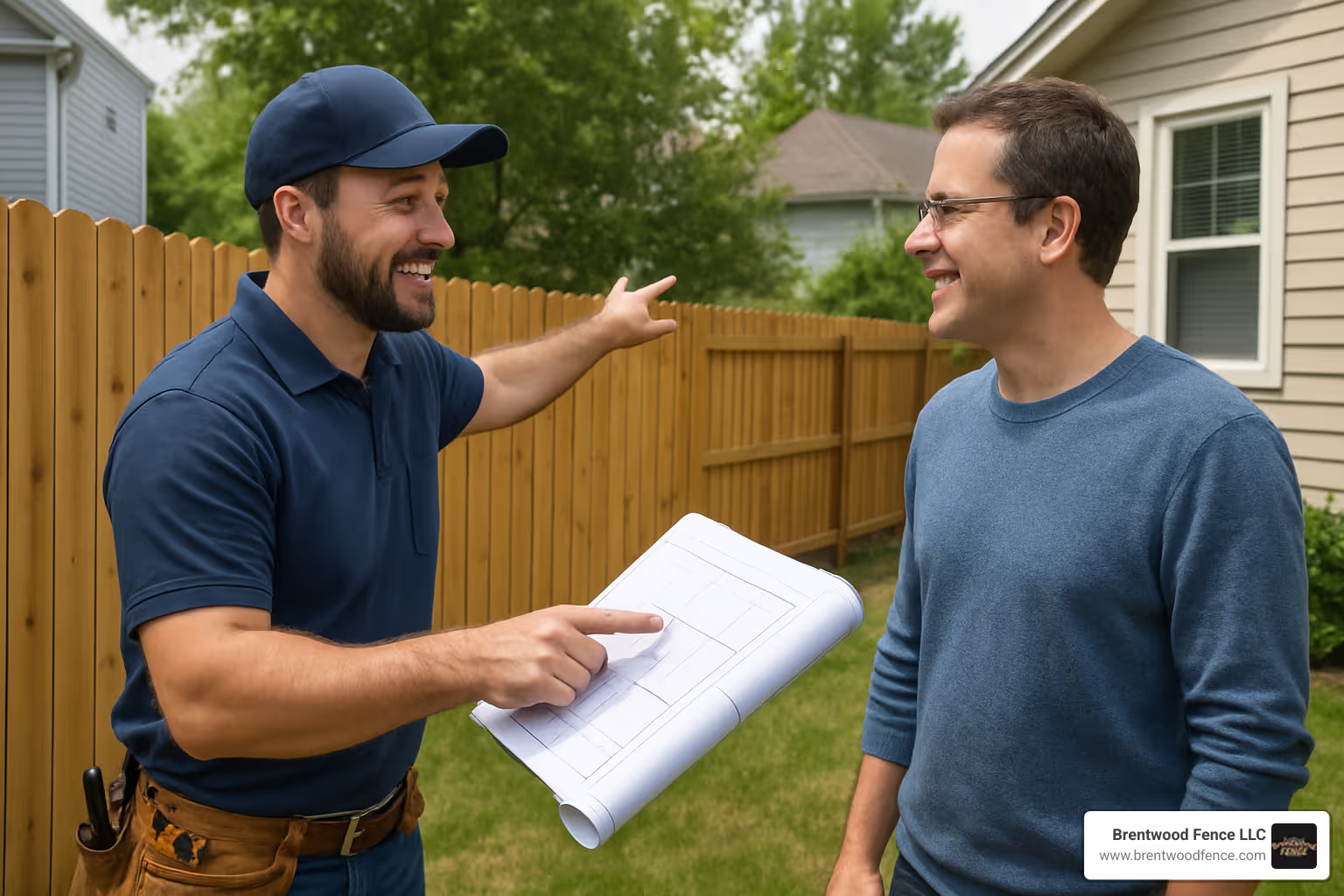
We hear certain questions time and again from homeowners considering a new fence. Let's address the most common concerns about working with fence installation companies.
Expect to invest between $1,760 and $4,500 for a typical residential installation. Your final price depends on several key factors.
Material choice creates the biggest price swing. Chain-link fencing runs about $7-12 per linear foot, while premium ornamental metal can reach $24-50 per linear foot.
Your property's characteristics significantly impact costs too. Longer fence lines require more materials. Steep slopes, rocky soil, or heavily wooded areas demand extra labor hours. Limited access points may require hand-carrying materials rather than using equipment.
Don't forget to account for gates (adding $100-500+ each) and any existing fence removal (typically $3-5 per linear foot). Here in New England, labor rates tend to run higher than the national average.
We provide free, no-obligation estimates based on an actual visit to your property to ensure accuracy.
The short answer: probably yes, and we'll take care of it for you.
Most towns and cities require permits for fences taller than 3-4 feet. Front yard fences face stricter scrutiny than backyard installations, and corner lots often have special rules to maintain visibility. Historic districts may have additional design guidelines.
Even if your municipality doesn't require a permit, your Homeowners Association might still demand approval.
At Brentwood Fence, we handle all permit-related paperwork as part of our service. We'll submit your property plans, provide detailed specifications, pay the necessary application fees (typically $50-200), schedule required inspections, and post the permit during installation.
Having installed fences throughout New Hampshire, Massachusetts, and Maine for years, we've developed relationships with local building departments in Exeter, Portsmouth, Manchester, Concord, Derry, Dover, Haverhill, and surrounding communities.
From your first phone call to the final walkthrough, most fence projects take 3-6 weeks to complete, though this timeline can vary.
After your initial consultation (1-3 days), we'll prepare a detailed quote. Once you sign the contract, we'll order materials immediately, though delivery typically takes 1-3 weeks. During this waiting period, we'll arrange for utility marking (3-5 business days) and submit permit applications (approval usually takes 1-2 weeks).
The actual installation is the quickest part—typically just 2-4 days for an average residential property.
Several factors can extend this timeline: custom material orders, weather conditions, complex terrain challenges, and high seasonal demand during spring and summer.
We pride ourselves on providing realistic timelines during the quoting process. If anything changes along the way, we'll keep you informed every step of the journey.
Have more questions about your specific fence project? Contact us for answers custom to your property and needs.
Finding the right fence for your home shouldn't feel overwhelming. After helping hundreds of New Hampshire, Massachusetts, and Maine homeowners transform their properties, we at Brentwood Fence LLC have seen how the right fence installation makes all the difference.
Throughout this guide, we've walked through everything from material selection to maintenance schedules. The takeaway? Fence installation companies with experience, proper licensing, and attention to detail deliver fences that stand strong through harsh New England winters and hot summers alike.
Your fence is more than just a boundary—it's a statement about your home. Whether you're looking to keep pets safe, create a private backyard retreat, or improve your property's curb appeal, professional installation ensures your investment pays dividends for years to come.
Remember those key considerations we discussed:
A well-installed fence can boost your property value by 50-70% of its cost while providing daily benefits you'll appreciate. From keeping children safe to creating the perfect backdrop for backyard gatherings, your fence becomes part of your home's story.
Many homeowners initially consider DIY installation to save money, but often find that professional installation prevents costly mistakes and delivers better long-term value.
When you're ready to transform your property with a beautiful, functional fence, we'd love to help. Our team at Brentwood Fence LLC brings decades of experience to every project, from simple backyard privacy fences to elaborate ornamental installations.
Take the first step toward your ideal outdoor space by requesting a free fencing estimate or contacting our team with any questions. We're here to make your fence installation experience smooth, straightforward, and enjoyable.
After all, good fences don't just make good neighbors—they make great homes.
Copyright 2022 Brentwood Fence | All Rights Reserved | Sitemap | Website by Plumb Development a Digital Marketing Agency